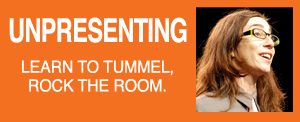All posts tagged social
TummelVision 70: Dina Mehta on Google Plus, disaster tummelling, and global community
Podcast: Play in new window | Download
Episode Notes
Dina Mehta of convo.org joins us from Mumbai/Bombay to talk about the advent of Google+, connecting people online in times of crisis, and global conversation and community.
Click here to replay the live chat.
TummelVision 64: Lloyd Davis on Social Artistry, Collaboration, and Travel
Podcast: Play in new window | Download
Episode Notes
Lloyd Davis (@lloyddavis) is Social Artist in Residence at the University of London’s Centre for Creative Collaboration. He blogs at Perfect Path and is best known as the founder of the Tuttle Club, London’s most popular and long-running meetup for anyone interested in the social web.
He’s currently resurrecting the Tuttle Club’s conversational process for consulting with large organisations about digital engagement strategies.
TummelVision 49: Lisa Bielawa on the social side of art and creativity
Podcast: Play in new window | Download
Episode Notes
In addition to the usual smart, witty banter, this episode of TummelVision is graced by a sample from the work of composer and vocalist Lisa Bielawa. Lisa is creating work that brings together many musicians and creates art in a very public way.
TummelVision 44: Stowe Boyd on social cognition, coding gender, and betweenness
Podcast: Play in new window | Download
Episode Notes
Social philosopher and webthropologist Stowe Boyd joins the TummelVision crew to talk about social cognition, coding gender, and “betweenness.”
Dan Pink/RSA: why and when $ doesn’t get results (aka being human for white guys)
Dan Pink‘s talk animated by RSA (who doesn’t seem to give the illustrator’s name, sorry). This is an evidence research-based translation of some of the basic premises we focus on in TummelVision: that we are motivated *by each other.* That we are not algorithms. The autonomy and mastery that Dan Pink is talking about, in my opinion, is what let’s someone know they are there and not merely a substitutie for a machine. Independence lets you feel choice and mastery gives you feedback and a sense of competence. But the best use of all these skills, the underlying motivator of why they are so rewarding is because they allow you to find ways to meaningfully connect with others and share usefulness and work for others.
In spiritual language that’s called service. Except our economy is now called that too. It’s the intent that’s not always the same. But as this slow thinking and analysis (as in Dan Pink’s talk) eventually moves forward it is slowly proved to people (aka the mostly white algorithm-lovin dudes running western business) that *feels* good is also effective.
-heather






